- HOME
- Sustainability
- Environment
- Biodiversity
Biodiversity
Approach and Policies
Group Policy (Environment)
Under the Group Policy, recognizing that the loss of biodiversity poses risks of harming the living and business environments of our stakeholders, we will contribute to the conservation of the natural environment through urban greening and forest development to restore forest cycles in Japan and provide habitats for diverse species.
In our business activities, we give due consideration to biodiversity throughout the Group and strive to develop our business with full awareness of biodiversity by appropriately complying with environmental laws and regulations. We consult with government agencies and other stakeholders from the planning stage as appropriate to mitigate impacts and restore the natural environment. In addition, considering our participation in the 30by30 Alliance for Biodiversity established by the Ministry of the Environment, we will work toward conserving at least 30% of our national lands and sea areas as natural environment zones by 2030.
Management
Targets and Results
Targets, KPIs, and Results
| 2030 | Unit | FY2019 | FY2020 | FY2021 | FY2022 | |
|---|---|---|---|---|---|---|
| KPICarbon storage through the development of wood-based buildings | 10,000 | t‐CO2/year | Since this target was set in FY2023, results will be disclosed starting that year | |||
| KPINumber of biodiversity certifications acquired (ABINC, JHEP, SEGES) | ー | 0 | 2 | 3 | 1 | |
Key performance indicators (KPIs) for priority issues (materiality) up to 2030
Initiatives
Risk Management System for Biodiversity
When starting a new development project, we conduct a biological survey on the development site and a risk assessment as necessary. Following the assessment results, we implement measures such as preservation, transplantation, and maintenance as necessary and periodically review and report.
For large-scale development projects, we conduct environmental assessments to ensure there will not be any damage to the existing natural environment. We have established procurement guidelines and give due consideration to conserving biodiversity and the sustainable use of resources when procuring raw materials.
For the forests we own in Okutama Town in Tokyo, we have created a five-year management plan and risk management manual and are uniquely managing the forests with full awareness of biodiversity.
Agreed to the Declaration of Biodiversity by Keidanren (Japan Business Federation)
In fiscal 2019, The group agreed to the Declaration with the Keidanren Biodiversity Declaration Initiatives. We are aware that initiatives for biodiversity are important management issues for the Group which is engaged in real estate and urban development. Therefore, we will promote these initiatives, taking into consideration the natural environment and ecosystems.
Joined the TNFD Forum
The Group supports the principles of the Taskforce on Nature-related Financial Disclosures (TNFD) and joined the TNFD Forum in July 2022. The TNFD is an international organization that was conceptualized at the 2019 World Economic Forum Annual Meeting (Davos) and established in June 2021 by the United Nations Environment Programme Finance Initiative (UNEP FI), the United Nations Development Programme (UNDP), the World Wildlife Fund (WWF), and the UK-based environmental NGO Global Canopy. Through its participation in the TNFD Forum, the Group will continue to assess the impact of all its business activities on biodiversity and promote initiatives for conservation and restoration.

Participation in the 30by30 Alliance for Biodiversity
30by30 is a target for nations to conserve or protect at least 30% of their lands and sea areas by 2030 to halt the loss of and restore biodiversity (nature-positive).
In order to achieve the target, the Ministry of the Environment has established the 30by30 Alliance for Biodiversity to expand the protected areas in Japan (currently about 20% of the land and 13% of the sea) and to promote efforts to certify areas that have been conserved by the private sector and others as OECMs. Nomura Real Estate Holdings joined this alliance in July 2022.
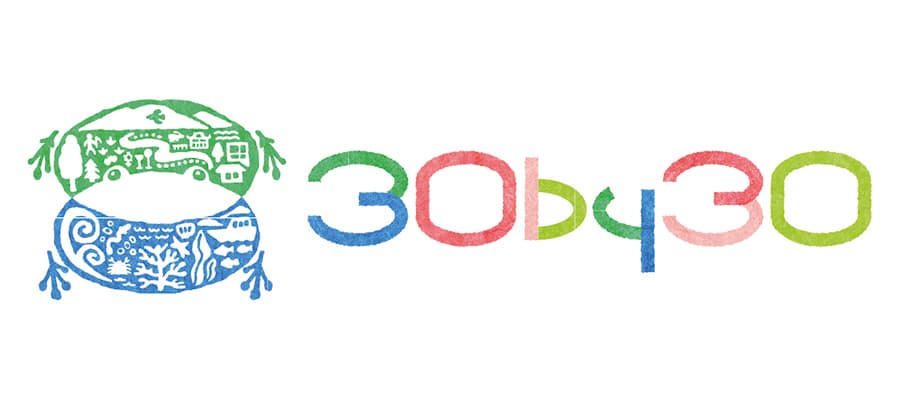
Acquisition of Biodiversity Certification
The Group actively seeks to acquire biodiversity certification for new construction and owned buildings, such as ABINC certification (certification registered by the Association for Business Innovation in harmony with Nature and Community)*1, JHEP (Japan Habitat Evaluation and Certification Program)*2, and SEGES (Social and Environmental Green Evaluation System series)*3, which assess and certify apartment buildings, office buildings, and other structures regarding efforts to create biodiversity friendly green areas. For PROUD Kokubunji, which was the Group’s first ABINC certification acquired in the condominium version, we surveyed the green areas on the site and worked to preserve and restore them as the Musashino Forest in accordance with the ABINC certification standards.
For PROUD Tower Meguro MARC as well, we secured about 82% of its large site (approximately 2.0 hectares) as open areas and considered local vegetation in the planning and development of these areas.
We will continue to develop real estate projects in harmony with nature.
ABINC (Association for Business Innovation in harmony with Nature and Community) certification: A program that assesses and certifies apartment buildings, office buildings, and other structures regarding efforts to create biodiversity friendly green areas in accordance with the Guidelines for Sustainable Business Sites prepared by the Japan Business Initiative for Biodiversity (JBIB)
JHEP (Japan Habitat Evaluation and Certification Program): A program that quantitatively assesses and certifies efforts to contribute to the preservation and restoration of biodiversity operated by the Ecosystem Conservation Society Japan.
SEGES (Social and Environmental Green Evaluation System series): A green certification program operated by the Organization for Landscape and Urban Green Infrastructure to comprehensively and objectively assess social and environmental functions created from the preservation of corporate green spaces and environmental communication.
| Year of certification | Certified facilities/condominiums |
|---|---|
| FY2014 | Yokohama Business Park (urban/SC version) |
| FY2015 | PROUD Kokubunji (condominium version) |
| Roka Koen The Residence*1 (condominium version) | |
| PROUD City Musashino Mitaka (condominium version) | |
| FY2017 | PROUD City Kichijoji*1 (condominium version) |
| PROUD Tower Musashi Koganei Cross*1 (condominium version) | |
| PROUD Season Inagi Minamiyama (detached housing complex version) | |
| Project for Noritake Shinmachi 3-chome, Nishi-ku, Nagoya City*1 (condominium version) | |
| FY2018 | HARUMI FLAG*1 (acquired ABINC ADVANCE certification*2) |
| The Gardens Ota Tamagawa*1 (condominium version) | |
| FY2020 | PROUD Tower Meguro MARC (urban/SC version) |
| Minamiyama Club House (detached housing complex version) | |
| FY2021 | PROUD City Musashino Mitaka (condominium version) |
| PROUD City Kotake Mukaihara (condominium version) | |
| FY2022 | Project for Nakamachi 3-chome, Setagaya-ku, Tokyo (tentative name) |
Application by multiple vendors
ABINC ADVANCE certification: Certification for long-term projects covering a wide area
PROUD Tower Meguro MARC (urban/SC version)
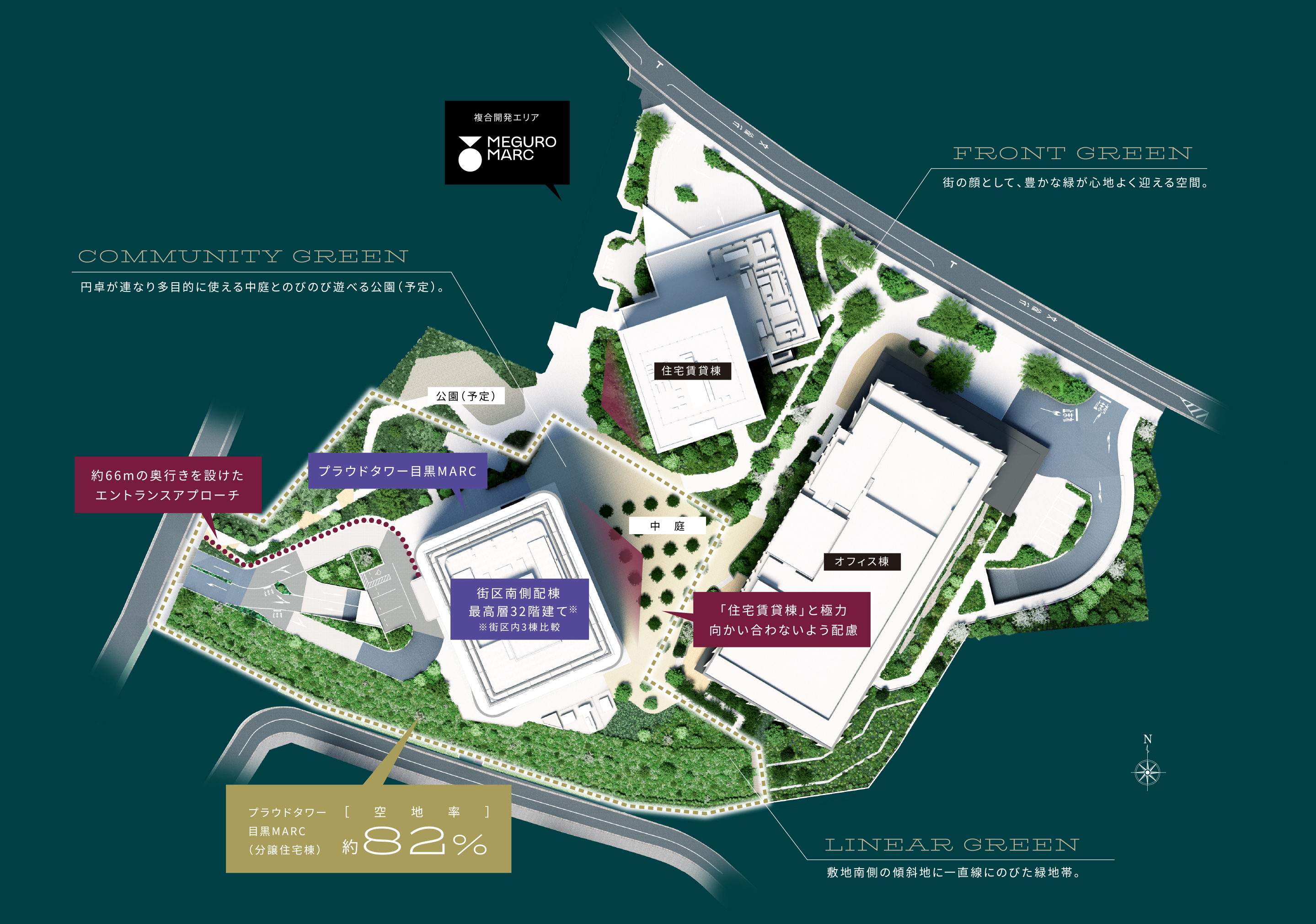
Due Consideration for Biodiversity in Design, Construction, and Raw Materials Procurement
The Group has distributed its Procurement Guidelines to more than 4,600 suppliers to ensure biodiversity is taken into account in the design, construction, and raw material procurement processes throughout the supply chain. In fiscal 2020, we began surveying suppliers. In fiscal 2022, we received survey responses from 154 of our top 300 suppliers (around 80% of the total) as key suppliers and engaged directly with ten companies. Going forward, we will continue to encourage suppliers to consider biodiversity.
Nomura Real Estate Group CSR Procurement Guidelines (excerpts of related provisions)
・ Endeavor to implement development and greening, taking into consideration the surrounding environment and biodiversity.
・ When procuring raw materials, take into consideration the conservation of biodiversity and sustainable use of resources. In particular, when procuring wood and wood products, take due care not to use illegal logged timber, and endeavor to use wood that has been produced by sustainable methods, such as recycled wood and certified wood.
Green Areas and Tree Planting in Consideration of the Surrounding Environment
The Group implements building site plans and tree planting plans in its real estate development and urban development activities giving consideration not only to the comfort of customers and local residents, but also to the surrounding environment and ecosystems. In all development projects, the Group requires project managers to submit Environmental and Product Planning Sheets for residential development projects and Sustainability Assessment Sheets for commercial real estate development projects, which include consideration for biodiversity.
Examples of key assessment points on the Environmental and Product Planning Sheet
・Acquisition of biodiversity certification
・Ingenuity and consideration in tree selection (e.g., use of existing trees)
・Ingenuity and consideration in the landscape of the roadside and surrounding areas (e.g., continuity with roadside trees)
・Creating green roofs and walls
Mori wo Tsunagu TOKYO project (Integrated Forest Management Project in Tokyo)—Supporting the Coexistence of Urban and Nature through Business Activities
The Group launched the Mori wo Tsunagu TOKYO project, which supports the coexistence of nature and the city in Tokyo, where it mainly operates its businesses. The forest obtained certification for Other Effective Area-based Conservation Measures (OECM)*1 in recognition of the rich biodiversity of Tsunagu Mori, the forest owned by the Group in Okutama Town, and its ecosystem management initiatives. We are creating a case model in Tokyo that can be applied to other regions by advancing initiatives for conserving ecosystems and important species while also contributing to a nature-positive future through ecosystem services.
A system under which the Ministry of the Environment certifies areas where biodiversity is being protected through initiatives with the private sector.



Project to Create Firey Habitats in the Yokohama Business Park
The Group has been presenting an annual exhibit of Urban Design for Firefly Habitats, for conserving biodiversity, since 2008 at the Yokohama Business Park (YBP) (Yokohama City, Kanagawa Prefecture), an office building and commercial facility that it owns, in cooperation with Yokohama National University. In fiscal 2023, the event will resume for the first time in four years, after having been suspended during fiscal 2020, 2021, and 2022 to help contain the spread of the COVID-19 pandemic. Firey observation events for local residents and hands-on rice planting programs for local elementary school students are offered, and the business park has become a site for considering and learning about biodiversity and environmental problems together with local residents. Yokohama Business Park acquired certification for consideration of conserving biodiversity under the ABINC certification program (urban/SC version) of the Association for Business Innovation in harmony with Nature and Community (ABINC).
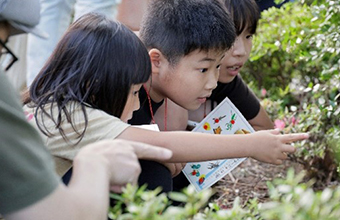
Use of Domestic Lumber
On March 9, 2022, Nomura Real Estate Holdings and Wing Co. Ltd. became the first private company to sign a triparty Agreement on the Promotion of Timber Use in Buildings with the Ministry of Agriculture, Forestry and Fisheries. As part of the agreement, we are aiming to use 10,000 m3 of domestic timber as building materials over the next five years. We are also striving to develop a stable supply chain for domestic timber while promoting the cyclic use of domestic forest resources and, in turn, achieve both the utilization and conservation of forest resources. The timber we procure is building material for our detached housing business, and 1,112 m2 was used in fiscal 2022.
The Nomura Real Estate Group Procurement Guidelines asks suppliers to use sustainable resources and timber to reduce the risks of disrupting the ecological balance and impacting local communities due to illegal logging. We actively promote the use of domestic and certified timber.
In our future construction projects, we plan to apply domestic lumber for the interiors of common areas in PROUD condominiums and introduce a wooden hybrid structure in our office building brand H¹O.
Domestic lumber not only allows us to provide a more comfortable living environment for our customers but also leads to the reduction of CO2 emissions and prevention of natural disasters by preserving the recycling of forest resources.
News Release (First private company to sign an agreement with the Ministry of Agriculture, Forestry and Fisheries to promote the use of wood in buildings) (Japanese only)
News Release (Initiatives of the Residential Development Business) (Japanese only)
News Release (Initiatives of the Commercial Real Estate Business) (Japanese only)
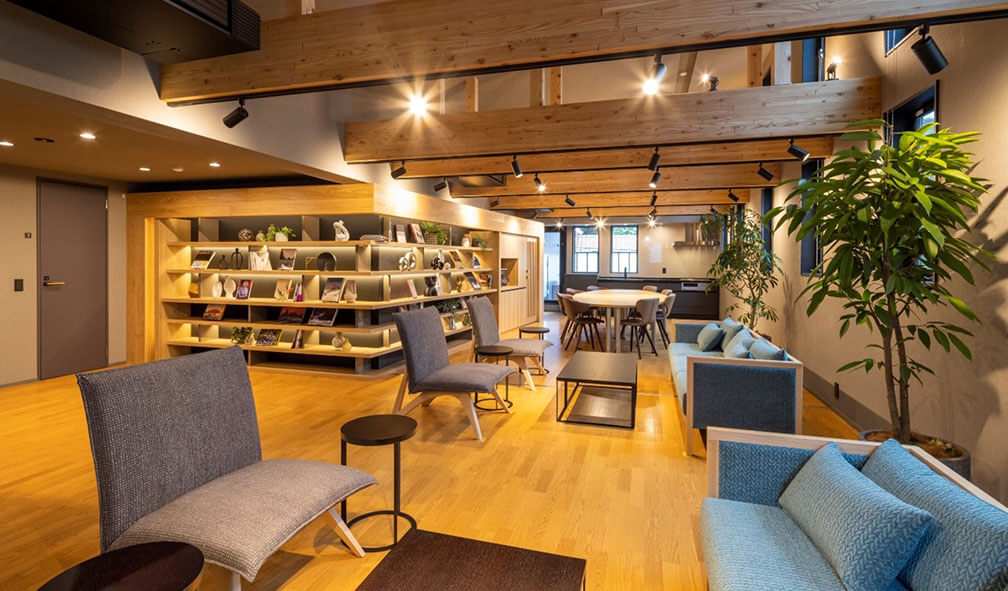
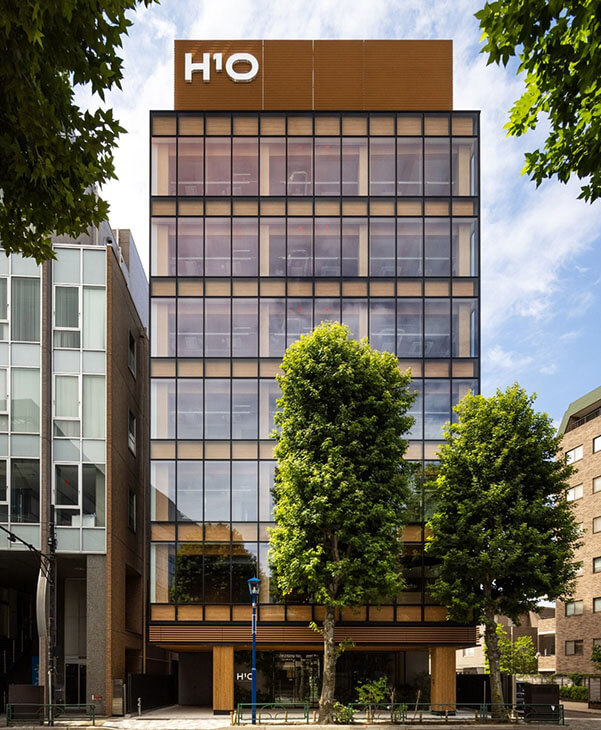
Promoting the Use of Wood Products in Hotel Businesses
As part of its environmental protection efforts, Nomura Real Estate Hotels is reviewing the amenities in its guestrooms and switching to biomass and wood-based products to reduce the amount of plastic used. Items to be updated included toothbrushes and hairbrushes made from rice husks, a biologically derived material, and toothbrushes and slippers made from natural bamboo. The switchover of equipment and decreasing the number of in-room fixtures has been underway from September 2022.
News Release (Initiatives in Hotel Businesses) (Japanese only)
Use of Certified Wood-Derived Paper and Plant-Based Inks in the Residential Development Business
As a general rule to further reduce environmental impact in the production of paper advertisements for PROUD and other condominium projects, the Nomura Real Estate Development’s Residential Development Division only uses paper made from wood from properly managed forests for its brochures, guides, direct mail, drawings, and newspaper inserts. In addition, it uses vegetable oil inks for printing, which biodegrade more readily than traditional petroleum-based solvents used in the past. Consequently, printed materials with these types of paper and inks display the appropriate logo and statement. We will continue to use environmentally sound products and strive to reduce our environmental impact.
Sustainability
- The Nomura Real Estate Group’s Stance on Sustainability
- Climate Change and the Natural Environment
- Society and Employees
- ESG Data


